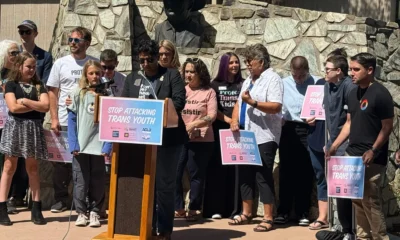Alexander Kolodin
Election Wake-Up Call: GOP Lawmakers React After Former Colleague Sounds Alarm

Maricopa County Recorder Justin Heap addressed legislative Republicans on Wednesday, highlighting a significant issue faced by election officials in rural counties: a lack of staff and resources. This admission prompted a reaction from lawmakers, who typically disregard such concerns from smaller counties but found credibility in Heap’s testimony.
Heap’s comments echoed long-standing arguments made by the Arizona Association of Counties, a stance often overlooked by lawmakers. Prior to Heap’s recent appointment, efforts by the association to communicate similar concerns had met with skepticism.
Rep. Alexander Kolodin (R-Scottsdale) acknowledged that legislative discussions frequently dismissed these objections as exaggerated. However, Heap’s firsthand perspective as a county recorder—having previously served in the legislature—has made an impact.
During the inaugural meeting of the House Ad Hoc Committee on Election Integrity, Heap articulated the challenges faced by counties in implementing proposed reforms. He expressed frustration at the lack of consideration for smaller counties’ unique needs.
“Legislators often craft laws for Maricopa and Pima County without acknowledging the realities in smaller counties,” Heap stated, noting that legislative actions sometimes do not account for varying circumstances across the state.
Heap emphasized that population disparities influence resource availability. For instance, while Maricopa County boasts nearly 4.5 million residents, smaller counties like Greenlee can have populations as low as 9,300, severely limiting staffing capabilities.
“Smaller counties simply don’t have the workforce to handle extensive legislative changes,” Heap explained. This sentiment was a key point of contention when lawmakers introduced bills that may be simple for larger counties but overwhelming for their smaller counterparts.
Kolodin recognized Heap’s insights as vital, admitting that he had not previously encountered such clarity on the counties’ limitations. “We’ve needed someone credible to outline these issues,” he said, praising Heap’s approach as both insightful and forthright.
Despite similar messages from the Arizona Association of Counties executive director, Jen Marson, lawmakers often failed to grasp the nuances. Kolodin noted that acknowledging specific staffing limitations in smaller counties made the argument more compelling.
While Heap’s perspective resonated with Kolodin, Marson had previously detailed these staffing challenges. For example, she highlighted that some offices, such as Greenlee’s elections department, function with a skeleton crew. “Operational differences between counties must reflect in our laws,” she stated.
The contrasting reception of Heap’s and Marson’s messages serves as a reminder of the need for clear communication in politics. Kolodin concluded, “Heap’s insights could foster better understanding and cooperation between legislators and rural county officials.”


















